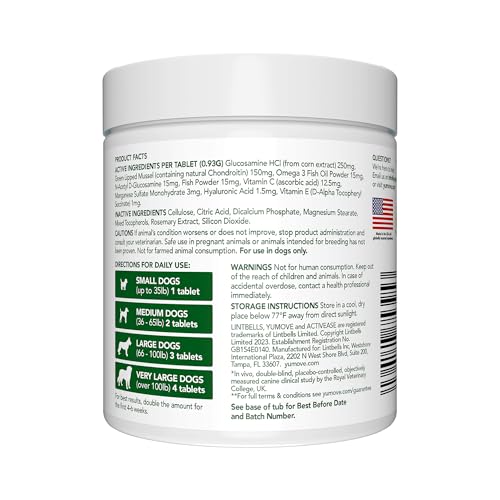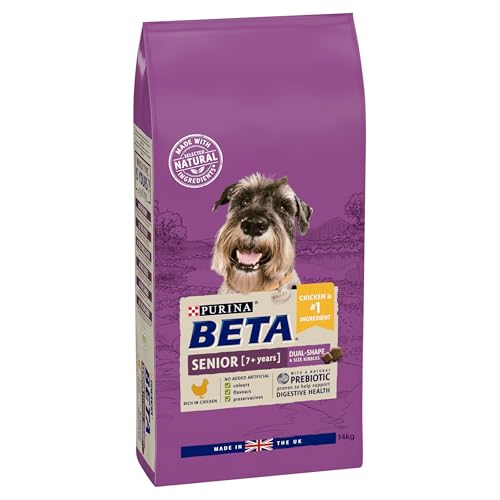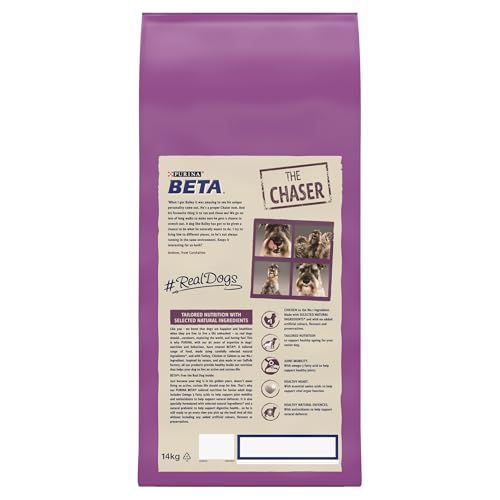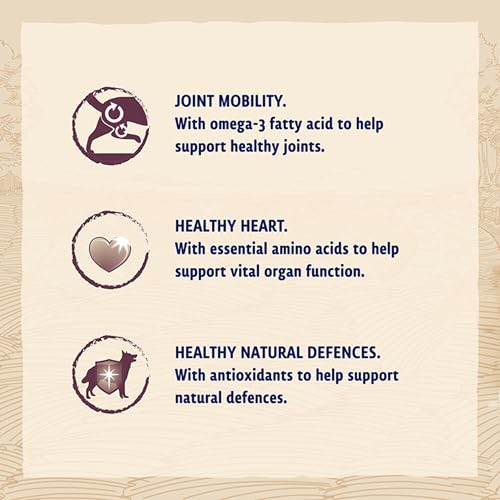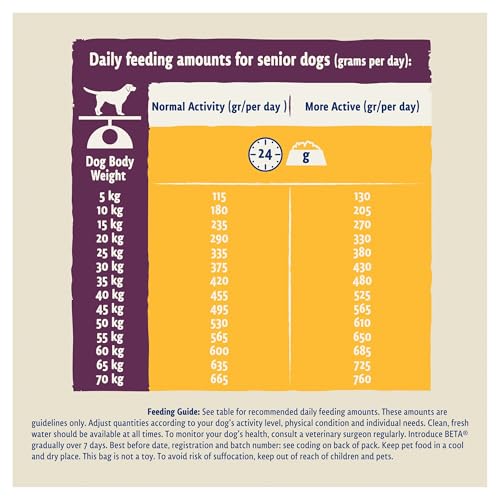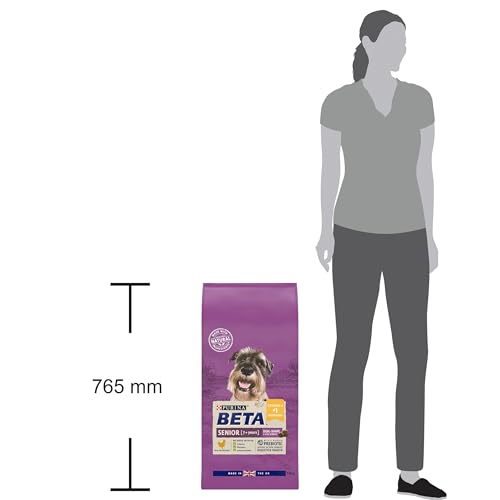



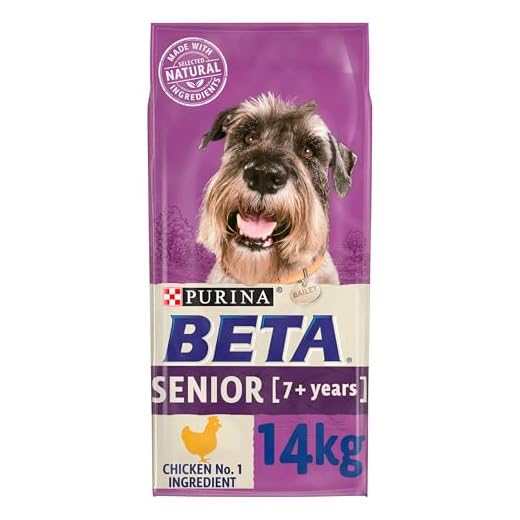
As our beloved furry friends age, they face many of the same challenges we do. One of the most common issues older dogs encounter is joint pain, which can significantly impact their quality of life. I’ve experienced this first-hand with my own senior dog, and it led me on a mission to find the best dog food that supports joint health. It’s been a journey filled with research, consultations with veterinarians, and a lot of trial and error. In this article, I’ll share the insights I’ve gained and the top recommendations for dog foods that can help alleviate joint discomfort in older dogs.
Older dogs often suffer from arthritis or other joint-related issues, which makes their daily activities more difficult and painful. While there are many supplements available, I’ve found that the right diet can make a substantial difference. The foods that work best are those formulated with specific ingredients known to support joint health, such as glucosamine, chondroitin, omega-3 fatty acids, and antioxidants. These components not only help in reducing inflammation but also in maintaining the cartilage that cushions the joints.
Choosing the right food for an older dog with joint issues is more than just picking a bag off the shelf. It’s about understanding the specific needs of your dog and matching them with the ingredients and nutrients that can offer the most benefit. Over the next few paragraphs, I will delve into the critical components to look for in dog food, review some of the top brands that specialise in joint health, and share some personal anecdotes about what has worked for my dog. My goal is to provide you with actionable information that can help your senior dog live a happier, more comfortable life.
Understanding the Nutritional Needs of Senior Dogs with Joint Problems
As our beloved dogs age, their bodies undergo various changes, one of the most significant being joint deterioration. This can lead to discomfort, reduced mobility, and a decline in their overall quality of life. To help manage these issues, it is crucial to focus on their nutritional needs. Tailoring their diet to support joint health can make a significant difference in their comfort and activity levels.
When considering the best diet for an older dog with joint issues, it is essential to look for specific nutrients that can aid in reducing inflammation and promoting joint health. These nutrients include omega-3 fatty acids, glucosamine, and chondroitin. Incorporating these into their diet can help to alleviate pain and improve mobility.
Key Nutrients for Joint Health
The most beneficial nutrients for senior dogs with joint problems include:
- Omega-3 Fatty Acids: These are known for their anti-inflammatory properties. Fish oil is a great source, helping to reduce joint inflammation and pain.
- Glucosamine and Chondroitin: These compounds help to maintain healthy cartilage and joint function. They are commonly found in supplements and specialised dog foods.
- Antioxidants: Ingredients like vitamins C and E help combat oxidative stress, which can contribute to joint deterioration.
- Protein: High-quality protein sources are essential for maintaining muscle mass, which supports and protects the joints.
Alongside these nutrients, ensuring the diet is low in unhealthy fats and calories is important to prevent weight gain, which can put additional strain on the joints. A balanced diet with appropriate portion control is vital for managing weight and keeping your senior dog active and healthy.
By understanding and addressing the specific nutritional needs of older dogs with joint issues, we can help them enjoy their golden years with less pain and more mobility. It is always a good idea to consult with a veterinarian to tailor a diet plan that meets the unique needs of your senior dog.
Essential Ingredients for Enhancing Joint Health in Senior Dogs
As our beloved dogs age, their joints often become a source of discomfort and mobility issues. Ensuring their diet includes key nutrients can significantly improve their quality of life. Knowing what to look for in dog food is crucial for supporting their joint health effectively.
While there are numerous ingredients that can benefit joint health, some stand out for their proven efficacy. Including these components in your older dog’s diet can help manage inflammation, maintain cartilage, and improve overall mobility.
Key Nutrients for Joint Support
-
Glucosamine: This natural compound is fundamental for maintaining healthy cartilage. Glucosamine helps rebuild cartilage and maintain synovial fluid, which is essential for joint lubrication.
-
Chondroitin Sulfate: Often paired with glucosamine, chondroitin sulfate helps prevent cartilage breakdown and supports joint repair. It enhances the elasticity of cartilage, making it crucial for older dogs with joint problems.
-
Omega-3 Fatty Acids: Found in fish oil and flaxseed, omega-3 fatty acids are renowned for their anti-inflammatory properties. These fatty acids help reduce joint inflammation and pain, promoting better mobility.
-
MSM (Methylsulfonylmethane): This organic sulfur compound has anti-inflammatory and pain-relief benefits. MSM supports collagen production, which is vital for joint and connective tissue health.
-
Antioxidants: Ingredients like vitamin E and C, as well as selenium, play a vital role in reducing oxidative stress in joints. Antioxidants help protect joint tissues from damage caused by free radicals.
-
Hyaluronic Acid: This substance is a component of synovial fluid, which lubricates joints. Supplementing with hyaluronic acid can improve joint flexibility and reduce pain associated with movement.
-
Green-Lipped Mussel: A rich source of omega-3 fatty acids, glucosamine, and chondroitin, green-lipped mussel extract has been shown to reduce pain and improve joint function in dogs.
Incorporating these ingredients into your senior dog’s diet can make a significant difference in their joint health and overall well-being. Always consult with your veterinarian to ensure the diet meets your dog’s specific needs and conditions.
Benefits of Omega-3 Fatty Acids and Glucosamine in Senior Dog Diets
As our furry friends age, their dietary needs evolve, particularly when it comes to maintaining joint health. Ensuring that their diet includes specific nutrients can make a significant difference in their mobility and overall quality of life. Two key components that have proven benefits for older dogs with joint issues are omega-3 fatty acids and glucosamine.
Omega-3 fatty acids are renowned for their anti-inflammatory properties. By reducing inflammation in joints, these essential fats can help alleviate pain and stiffness, making movement easier for senior dogs. Fish oil is a common source of omega-3, and including it in your dog’s diet can lead to noticeable improvements in their comfort and activity levels. Additionally, omega-3 fatty acids support overall health, contributing to a shinier coat and healthier skin.
Role of Glucosamine in Joint Health
Glucosamine, on the other hand, plays a crucial role in the maintenance and repair of cartilage, which is vital for joint function. As dogs age, the natural production of glucosamine decreases, leading to the wear and tear of cartilage. Supplementing their diet with glucosamine can help slow this degradation process, promote the repair of damaged tissues, and maintain the cushioning between joints, which is essential for pain-free movement.
- Anti-Inflammatory Benefits: Omega-3 fatty acids help reduce joint inflammation, which is a common issue in senior dogs.
- Cartilage Maintenance: Glucosamine supports the repair and maintenance of joint cartilage.
- Improved Mobility: Combining these nutrients can enhance overall mobility, allowing older dogs to stay active and engaged.
- General Health Benefits: Omega-3s contribute to a healthier coat and skin, further supporting a dog’s overall well-being.
Integrating these nutrients into your senior dog’s diet can be achieved through specific supplements or by choosing dog foods formulated to include them. It’s always best to consult with a veterinarian to determine the appropriate dosage and to ensure that these additions will benefit your pet without any adverse effects.
Grain-Free vs. Grain-Inclusive: Which is Better for Joint Health?
As my dog ages, I’ve been paying close attention to his diet, especially with his increasing joint problems. The debate between grain-free and grain-inclusive dog foods has been quite prominent, and I wanted to delve deeper into how each option might impact my dog’s joint health.
Grain-free diets have gained popularity, often being marketed as a healthier choice for dogs, particularly those with food sensitivities or allergies. These diets typically substitute grains with legumes or potatoes. While some believe that grain-free options can help reduce inflammation, which is beneficial for joint health, there isn’t a one-size-fits-all answer.
Grain-Free Diets: Potential Benefits and Drawbacks
Proponents of grain-free diets argue that these foods can lead to a reduction in inflammation. By eliminating grains, which some dogs may find hard to digest, there may be a decrease in overall inflammation, potentially easing joint pain. Additionally, grain-free formulas often contain higher levels of animal protein, which can support muscle maintenance around the joints.
However, it’s essential to note that not all grain-free diets are created equal. Some grain-free foods use high-glycaemic index ingredients like potatoes and peas, which might not be the best for long-term health. Moreover, recent studies have raised concerns about a possible link between grain-free diets and heart disease in dogs, making it crucial to consult with a vet before making significant dietary changes.
Grain-Inclusive Diets: Consistency and Nutritional Balance
On the other hand, grain-inclusive diets provide a balanced source of carbohydrates, which can be beneficial for overall energy levels and digestion. Grains such as rice, oats, and barley are not only easily digestible but also offer essential nutrients like fibre, vitamins, and minerals.
For dogs with joint issues, maintaining a healthy weight is crucial, and the fibre in grains can help keep them full and satisfied without overfeeding. Additionally, many grain-inclusive dog foods are formulated with added supplements like glucosamine and chondroitin, which are specifically designed to support joint health.
Ultimately, the choice between grain-free and grain-inclusive diets should be tailored to your dog’s specific needs and health conditions. Consulting with a veterinarian can provide personalised advice, ensuring that your dog’s diet supports their joint health and overall well-being.
- Consider your dog’s specific dietary needs and any potential allergies.
- Evaluate the quality and nutritional content of the dog food, regardless of whether it includes grains.
- Monitor your dog’s weight and adjust their diet to maintain a healthy weight.
- Incorporate joint supplements if recommended by your vet.
In my experience, paying attention to these factors has helped me make more informed decisions about my dog’s diet, aiming to provide the best support for his joint health as he ages.
Recommended Dog Food Brands for Older Dogs with Joint Issues
As our beloved dogs age, they often face various health challenges, including joint problems. Ensuring they receive the right nutrition can make a significant difference in their quality of life. Selecting dog food that caters specifically to senior dogs with joint issues is crucial for maintaining their mobility and overall well-being.
I’ve researched and tested numerous brands to identify those that provide the best support for aging dogs with joint concerns. The following brands are highly regarded for their specialised formulations that include joint-friendly ingredients such as glucosamine, chondroitin, and omega-3 fatty acids.
Key Brands for Senior Dogs with Joint Health Needs
- Hill’s Science Diet: Hill’s Science Diet offers a range of senior dog food options designed to support joint health. Their recipes often include high levels of glucosamine and chondroitin, essential for maintaining joint cartilage. Additionally, the balanced nutrition in these formulas helps with weight management, reducing the stress on joints.
- Royal Canin: Known for its breed-specific formulas, Royal Canin also provides excellent options for senior dogs of all breeds. Their products for older dogs are enriched with EPA and DHA from fish oil, which are beneficial for reducing inflammation and supporting joint health. Their nutrient profile also promotes overall vitality in senior dogs.
- Blue Buffalo Life Protection Formula: Blue Buffalo’s senior dog food includes natural ingredients with added glucosamine and chondroitin. This brand stands out for its commitment to high-quality protein sources and antioxidants, which help support a strong immune system and healthy joints.
- Nutro Ultra Senior Dry Dog Food: Nutro Ultra’s senior recipe is crafted with a blend of lean proteins, whole grains, and a unique trio of superfoods: coconut, chia, and kale. These ingredients, along with added glucosamine and chondroitin, ensure that your senior dog receives the necessary nutrients for joint health and overall well-being.
- Merrick Grain-Free Senior: Merrick’s grain-free formula for seniors is rich in protein and healthy fats. The inclusion of glucosamine and chondroitin supports joint function, while the grain-free aspect can be beneficial for dogs with food sensitivities. Their recipes also include high levels of omega-3 and omega-6 fatty acids for added joint support.
Homemade Dog Food Recipes for Senior Dogs with Joint Problems
As our beloved dogs age, they often face joint issues that can significantly affect their quality of life. While there are many commercial options available, I believe that preparing homemade meals allows us to ensure the freshest and most nutritious ingredients for our senior dogs. By incorporating specific nutrients that support joint health, we can help our furry friends stay active and comfortable in their golden years.
One of the key components in managing joint health is the inclusion of anti-inflammatory ingredients and those rich in omega-3 fatty acids. These nutrients can help reduce inflammation and support overall joint function. Additionally, ensuring that the diet is balanced with adequate protein, healthy fats, and essential vitamins is crucial for maintaining their overall well-being.
Homemade Recipes for Senior Dogs
1. Turkey and Sweet Potato Stew
- 1 pound ground turkey
- 1 cup cooked quinoa
- 1 sweet potato, diced
- 1 carrot, chopped
- 1/2 cup peas
- 2 tablespoons olive oil
- 1/4 teaspoon turmeric
Cook the ground turkey in a large pot until browned. Add the diced sweet potato, carrot, and peas, cooking until tender. Mix in the cooked quinoa, olive oil, and turmeric. Let the stew cool before serving it to your dog.
2. Salmon and Spinach Mix
- 2 salmon fillets
- 1 cup brown rice
- 1 cup spinach, chopped
- 1/2 cup blueberries
- 1 tablespoon flaxseed oil
Bake or steam the salmon until fully cooked, then flake it into pieces. Cook the brown rice separately. In a large bowl, combine the salmon, brown rice, spinach, and blueberries. Drizzle with flaxseed oil before serving. Ensure the mixture is cooled to a safe temperature for your dog.
3. Chicken and Veggie Delight
- 1 pound chicken breast, diced
- 1 cup barley
- 1 zucchini, chopped
- 1/2 cup green beans
- 1/2 cup pumpkin puree
- 1 tablespoon fish oil
Cook the diced chicken breast in a pan until no longer pink. Meanwhile, prepare the barley according to package instructions. Steam the zucchini and green beans until tender. In a large mixing bowl, combine the chicken, barley, zucchini, green beans, and pumpkin puree. Add the fish oil and mix thoroughly. Allow the food to cool before serving.
These recipes are designed to provide the necessary nutrients to support joint health while also being delicious and easy to prepare. Always consult with your vet before making any major changes to your dog’s diet, especially if they have specific health conditions or dietary needs.
Tips for Transitioning Your Dog to a Joint-Friendly Diet
Transitioning your older dog to a joint-friendly diet is a crucial step in managing their joint issues and improving their overall quality of life. This process requires careful consideration and gradual changes to ensure your dog adapts well to the new diet.
Here are some practical tips to help you make this transition as smooth as possible for your beloved pet:
Steps for a Smooth Transition
- Consult Your Veterinarian: Before making any dietary changes, it is essential to consult your veterinarian. They can provide personalised recommendations based on your dog’s specific health needs and conditions.
- Gradual Introduction: Start by mixing a small amount of the new joint-friendly food with your dog’s current food. Gradually increase the proportion of the new food over 7-10 days. This helps to avoid digestive upsets.
- Monitor Your Dog’s Reaction: Keep an eye on your dog’s behaviour, stool quality, and overall health during the transition period. Any signs of digestive discomfort or allergies should be reported to your vet.
- Incorporate Joint Supplements: Consider adding joint supplements like glucosamine and chondroitin to your dog’s diet. These can provide additional support and enhance the benefits of a joint-friendly diet.
- Stay Consistent: Consistency is key. Ensure you stick to the new diet and avoid giving your dog foods that can exacerbate joint issues, such as those high in preservatives and artificial additives.
- Hydration is Important: Make sure your dog has access to plenty of fresh water. Proper hydration supports joint health and overall wellbeing.
- Regular Exercise: Complement the new diet with regular, low-impact exercises such as swimming or gentle walks. This helps maintain your dog’s joint mobility and muscle strength.
Transitioning your older dog to a joint-friendly diet can significantly enhance their comfort and mobility. By following these tips and remaining patient, you can ensure a successful dietary change that supports your dog’s joint health and overall happiness. Remember, the goal is to provide a balanced and nutritious diet that caters to your dog’s specific needs, helping them enjoy their golden years with less pain and more vitality.
For the best results, always work closely with your veterinarian to tailor a diet plan that is best suited for your dog’s unique health requirements.
Best Dog Food For Older Dogs With Joint Issues
Features
| Part Number | GR00142212 |
| Model | 195511/3854 |
| Color | transparent |
| Release Date | 2015-03-30T00:00:01Z |
| Size | 10 kg (Pack of 1) |
| Language | English |
| Price history for Grain Free Salmon Dog Food for Digestion | |
|---|---|
|
Latest updates:
|
|
Features
| Part Number | 12274093 |
| Model | TP-7613035152908_Vendor |
| Release Date | 2015-08-24T00:00:01Z |
| Size | 11 kg (Pack of 1) |
| Language | Spanish |
| Price history for Hypoallergenic Dry Dog Food for Allergies | |
|---|---|
|
Latest updates:
|
|
Features
| Part Number | FTJA15 |
| Model | 02SKFTMAP15 |
| Release Date | 2014-06-30T00:00:01Z |
| Size | 15 kg (Pack of 1) |
| Language | English |
Features
| Part Number | YMS120 |
| Model | YMS120 |
| Warranty | 2 year Manfacturer |
| Color | White |
| Size | 120 Tablets |
Features
| Part Number | 12231689 |
| Model | 12531980 |
| Color | transparent |
| Release Date | 2014-05-23T00:00:01Z |
| Size | 1 count (Pack of 1) |
Features
| Is Adult Product | |
| Release Date | 2025-05-17T00:00:01Z |
| Language | English |
| Number Of Pages | 213 |
| Publication Date | 2025-05-17T00:00:01Z |
Q&A:
What ingredients should I look for in dog food for older dogs with joint issues?
When choosing dog food for older dogs with joint issues, look for ingredients like glucosamine and chondroitin, which support joint health. Omega-3 fatty acids, often found in fish oil, can help reduce inflammation. Additionally, high-quality protein sources are essential to maintain muscle mass, and antioxidants can support overall health.
Is grain-free dog food better for senior dogs with arthritis?
Grain-free dog food is not necessarily better for senior dogs with arthritis. The most important factor is the inclusion of ingredients that support joint health, such as glucosamine, chondroitin, and omega-3 fatty acids. However, if your dog has a grain allergy or sensitivity, a grain-free diet might be beneficial. Always consult your vet for personalised advice.
How can I tell if my senior dog’s food is helping their joint issues?
Improvement in your dog’s mobility and a reduction in stiffness or pain are signs that their food might be helping their joint issues. You might notice they are more willing to go for walks, climb stairs, or play. Regular vet check-ups are also important to monitor their joint health and adjust their diet as needed.
Should I consider supplements in addition to special dog food for my older dog with joint problems?
Yes, supplements can be a beneficial addition to a specialised diet for older dogs with joint problems. Glucosamine, chondroitin, and omega-3 supplements can provide extra support. However, it’s essential to consult your vet before adding any supplements to ensure they are safe and appropriate for your dog’s specific needs.





















